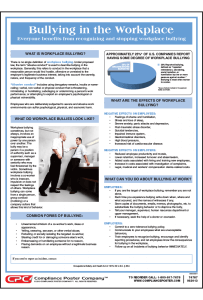On April 23, 2019, Tennessee Governor Bill Lee signed H.B. 2016 into law. The bill, which came into effect immediately upon signature, amends the Tennessee Healthy Workplace Act to address private employers as well as state or local government entities. The new law extends the protections created by the Tennessee workplace bullying prevention law, originally passed in 2014, to private employers to encourage organizations in all sectors to adopt comprehensive anti-abuse policies for the workplace.
What Employers Need to Know About Workplace Bullying
 Abusive conduct in the workplace is a widespread problem that can have severe consequences. According to a 2017 survey by the Workplace Bullying Institute, 19% of American workers have past or current experience with abusive conduct at work. Employees who are bullied may experience stress-related psychological and/or physical illness, and even those who simply witness bullying are likely to experience adverse effects due to the stress of working in a difficult work environment.
Abusive conduct in the workplace is a widespread problem that can have severe consequences. According to a 2017 survey by the Workplace Bullying Institute, 19% of American workers have past or current experience with abusive conduct at work. Employees who are bullied may experience stress-related psychological and/or physical illness, and even those who simply witness bullying are likely to experience adverse effects due to the stress of working in a difficult work environment.
Allowing abusive conduct in the workplace to continue unchecked can result in high absenteeism, low productivity and poor morale, and may even lead to incidents of workplace violence. Employers may also be considered liable for severe or pervasive conduct committed by a supervisor or employee which falls under the rubric of unlawful harassment, as well as any abusive conduct which impairs the health and safety of workers.
Tennessee Workplace Bullying Prevention Law
In 2014, Tennessee became the first state to pass the Healthy Workplaces Act, a law intended to encourage employers to adopt policies to address and prevent abusive conduct in the workplace. The law, which then applied only to public sector employers, required the Tennessee Advisory Committee on Intergovernmental Relations (TACIR) to consult with the Department of Human Resources and municipal and county organizations to create a model abusive conduct prevention policy for employers.
Under the law, abusive conduct is defined as “acts or omissions that would cause a reasonable person, based on the severity, nature, and frequency of the conduct, to believe that an employee was subject to an abusive work environment.” This might include:
- Repeated verbal abuse in the workplace, including derogatory remarks, insults, and epithets;
- Verbal, nonverbal, or physical conduct of a threatening, intimidating, or humiliating nature; or
- The sabotage or undermining of an employee’s work performance in the workplace.
The Model Abusive Conduct Prevention Policy created by TACIR in 2015 is intended to provide protection for both employers and employees by providing employers with a model for recognizing and responding to abusive workplace conduct in a manner which does not result in retaliation against employees who report abusive conduct. Although the document refers to public workplaces, the model policy is also applicable to private sector workplaces and includes the following aspects:
- Statement of commitment, values, and purpose
- Definition of abusive conduct, as defined by the Tennessee Healthy Workplace Act
- Description of the employer responsibilities, including expectations of supervisors and that employees will be informed of the abusive conduct prevention policy
- Description of employee responsibilities, including employees who witness incidents of abusive conduct
- Anti-retaliation statement
- Training for supervisors and employees
- Procedures for filing complaints, investigations, and resulting actions for the parties involved
- Confidentiality statement
What Should Private Employers Do Next?
Although employers are not required to adopt the model policy created by TACIR, those who choose to adopt the policy in full (or a policy conforming to its requirements) will receive immunity under state law for any abusive conduct committed by an employee which results in negligent or intentional infliction of mental anguish. The new law also specifies that the immunity provision of the law “does not create a cause of action against an employer who does not adopt the model policy created by TACIR” or a policy which adheres to the same requirements.
Private employers who wish to adopt a workplace abusive conduct prevention policy should review the full Model Abusive Conduct Prevention Policy document provided by TACIR for guidance. And don’t forget to post CPC’s Bullying the Workplace Poster to reinforce anti-bullying policies and training! This non-mandatory poster provides important information about how to detect and respond to workplace bullying, and includes a fill-in space for employers to provide information on how to report a complaint in the workplace.
KEEP IN TOUCH WITH CPC!
To keep up with the latest in labor law news and posting compliance, follow us on Facebook, LinkedIn, or Twitter or subscribe to this blog! You can also contact us by phone, email, or chat to order one of CPC’s signature labor law compliance products or learn more about your company’s individualized posting obligations.
Please keep in mind that CPC cannot provide legal advice. If you have a question about how labor law applies to your specific workplace situation, please consult your local labor department or an employment lawyer.
|
|

